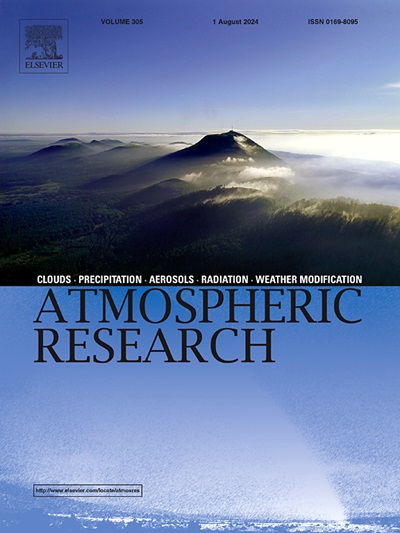复杂地形对西班牙骤降事件数值模拟的影响
IF 4.5
2区 地球科学
Q1 METEOROLOGY & ATMOSPHERIC SCIENCES
引用次数: 0
摘要
下沉气流是指从对流层中层快速下降并到达地球表面的局部强下沉气流。它通常由雷暴或超级暴风圈引发。下沉气流会对建筑物、基础设施造成重大破坏,并对航空交通构成巨大威胁。2018 年 7 月 1 日,萨拉戈萨机场(西班牙)附近发现了许多超级暴风圈,其中至少有一个暴风圈产生了下沉气流,影响到了机场,给周边地区造成了重大损失。这里使用天气研究和预报(WRF-ARW)数值天气预报模式对这一事件进行了模拟。为了研究该地区复杂的地形是否对研究区域上空的超级暴风和下沉气流的发展有重要影响,我们进行了三次不同的 WRF-ARW 地形实验。三个实验中的一个使用默认地形作为对照,另一个使用 90% 平滑地形,第三个实验使用高分辨率数据集。对每个地形实验的几个大气和对流变量进行了比较。结果表明,当地形复杂度降低时,MUCAPE 显然更高。平滑过程导致风流更加均匀,有助于形成大量超级卷流。然而,在对照和高分辨率地形实验中,超级暴风圈穿过山谷和山脉,在这些地方独特地再现了地表风的发散,并观测到最高的反射率值。在这一过程中,来自地中海的水汽平流至关重要,在平滑地貌实验中,由于缺乏地貌屏障,水汽平流更深入研究区域。地貌影响动态和热力学特征,而这些特征对骤降的形成和发展有相当大的影响。本文章由计算机程序翻译,如有差异,请以英文原文为准。
Effect of complex orography on numerical simulations of a downburst event in Spain
A downburst is a localized and intense downdraft of air that descends quickly from the middle troposphere and reaches the Earth's surface. It is frequently originated by a thunderstorm or a supercell. Downburst winds can cause significant damage to buildings, infrastructure, and pose a great threat to aviation traffic. On July 1, 2018, many supercells were spotted near the Zaragoza Airport (Spain), and at least one of them generated a downburst that affected the airport, causing significant damage in the surrounding area. This event is here simulated using the Weather Research and Forecasting (WRF-ARW) numerical weather prediction model. Three different WRF-ARW orography experiments are carried out to investigate if the region's complex orography has an important role in supercell and downburst development over the research area. One of the three experiments uses the default orography as control; another one uses a 90 % smoothed orography, and the third experiment is configured with a high-resolution dataset. Several atmospheric and convective variables are compared for each orography experiment. Results show that MUCAPE is clearly higher when the orography complexity is reduced. The smoothing process leads to a more uniform wind flow, contributing to the formation of numerous supercells. However, supercells channel through valleys and mountains in the control and high-resolution orography experiments, where the surface wind divergences are uniquely reproduced, and the highest reflectivity values are observed. Moisture advection from the Mediterranean Sea is essential in the process, reaching more deeply into the study region in the smoothed orography experiment due to the lack of orographic barriers. Orography affects dynamic and thermodynamic features, which have considerable effects on the formation and development of downbursts.
求助全文
通过发布文献求助,成功后即可免费获取论文全文。
去求助
来源期刊

Atmospheric Research
地学-气象与大气科学
CiteScore
9.40
自引率
10.90%
发文量
460
审稿时长
47 days
期刊介绍:
The journal publishes scientific papers (research papers, review articles, letters and notes) dealing with the part of the atmosphere where meteorological events occur. Attention is given to all processes extending from the earth surface to the tropopause, but special emphasis continues to be devoted to the physics of clouds, mesoscale meteorology and air pollution, i.e. atmospheric aerosols; microphysical processes; cloud dynamics and thermodynamics; numerical simulation, climatology, climate change and weather modification.
 求助内容:
求助内容: 应助结果提醒方式:
应助结果提醒方式:


